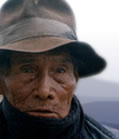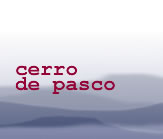Juan was born in Rancas and moved to Cerro de Pasco as a student. He became a miner there and got married. Later, he was fired by the mining company and returned to live in Rancas. He talks about aspects of mining life and life in the community.
He discusses the historical development of Rancas, and the effect mining has had in the area, including the changing territorial boundaries and the way economic activity has changed. He talks about the changing marriage patterns, education being mainly for males and the custom of men being the heads of households and titled members of the community.
He also talks about what it means to be a comunero (registered community member with rights and responsibilities) and describes his own experiences as a miner, the lack of freedom they had and the different working conditions depending on who owned the mines. Lastly he discusses his hopes for his children.
|
You will need a password from Panos to view the full
transcript of the interview. To apply for a password, click here.
Once you have a password, click here to go to the beginning
of the transcript. You can also click on any section of the
breakdown of content below and go straight to the
corresponding part of the transcript.
|
| Section 1 |
His family history – he's from a campesino community; wife's from Cerro de Pasco – a mining community.
|
| Section 1-2 |
Changes in Rancas: used to depend on livestock but now it has become the centre of communications for other communities.
|
| Section 2 |
History – Spanish (colonialism), liberation, gringos (North Americans who ran/owned the mines) and mining companies, nationalisation. Economic history – importance of livestock.
Environment – pollution. Farming - used to grow maca (small tuber, like a radish)/potatoes, but now only cattle because of lack of help and resources
|
| Section 3 |
Traditions/customs/festivals.
Changes in customs due to mobility/education
|
| Section 3-4 |
Changes in family customs especially marriage customs - he wasn't allowed to get married in Rancas as he had no “referees”, this has changed.
|
| Section 4-5 |
Equality - men are heads of households unless women are widowed or divorced, in which case they can also be named members of the community; he claims society is still machista (chauvinistic) and that women have less education but it’s because people couldn’t afford to send them to school.
|
| Section 5 |
Education - claims that recent changes in educating women to same standard as men may be result of European influence. Refers to not educating women as “a total waste for society”. He doesn't want his daughters to be treated as ignorant and claims there are equal opportunities in Rancas now.
|
| Section 5-6 |
Talks of development of Rancas due to mobility both of outsiders (coming through the community) and of people within the community visiting other places.
|
| Section 6 |
Economic development, enterprise in urban areas and cattle in rural areas. Claims Rancas is only community to be compensated for the pollution caused by mining and that pollution will take 100 years to get rid of.
A comunero has to pay subscription, which gives you rights to land and cattle, and you must take part in communal work.
|
| Section 7 |
Minka/washka (community, communal work)
Talks about Rancas losing land and about territorial changes as a result of the Spanish occupation and the invasion of the mining companies. Mentions Garashipo (literally, cured leather in Quechua), a book which shows original boundaries. The mines took land from Rancas.
|
| Section 8 |
He says he is not legally a comunero as wasn't registered in community book but he is the son of a comunero. He went to study in Cerro de Pasco and then became a miner.
|
| Section 8-9 |
Had to decide between going off to Mexico as a missionary student or going to work in the mines. He chose mining to be close to family and because he was afraid that missionaries might be pishtacos (people who kill other people, comes from Quechua).
|
| Section 9 |
Powerful description of lack of freedom and independence as a miner: “they squeeze the juice out of you, you sweat it out and you leave feeling exhausted”.
He started cohabiting (servinacuy) before marriage and after a period of time you are committed to that person.
|
| Section 10 |
To live in the mining compound you had to have minimum of seven children, which resulted in miners having more children. He lived on the town’s outskirts. The standard of housing in mining compounds is very poor.
Starts to talk about social change eg changes in language due to foreign influences.
|
| Section 11 |
Changes as a result of nationalisation - claims gringos were exploiting Peru for cheap labour; after nationalisation there were more benefits. Nowadays again being exploited and company cutting back on workers’ benefits. No trade union or solidarity in form of sport or mining songs, mines not progressive
|
| Section 12 |
His personal concerns about inequality and exploitation made him a natural choice to represent miners; eventually became Federation Leader and standardised miners’ timetable; was moved to “maintenance”, still tried to make changes, got the sack, lost all pension rights
|
| Section 13 |
Talks about his children who are working or being educated and are not miners. His mother taught him how to save and this meant he could afford for his children to be educated. He believes that their futures will be very different to his life. Most miners’ children become miners. |


